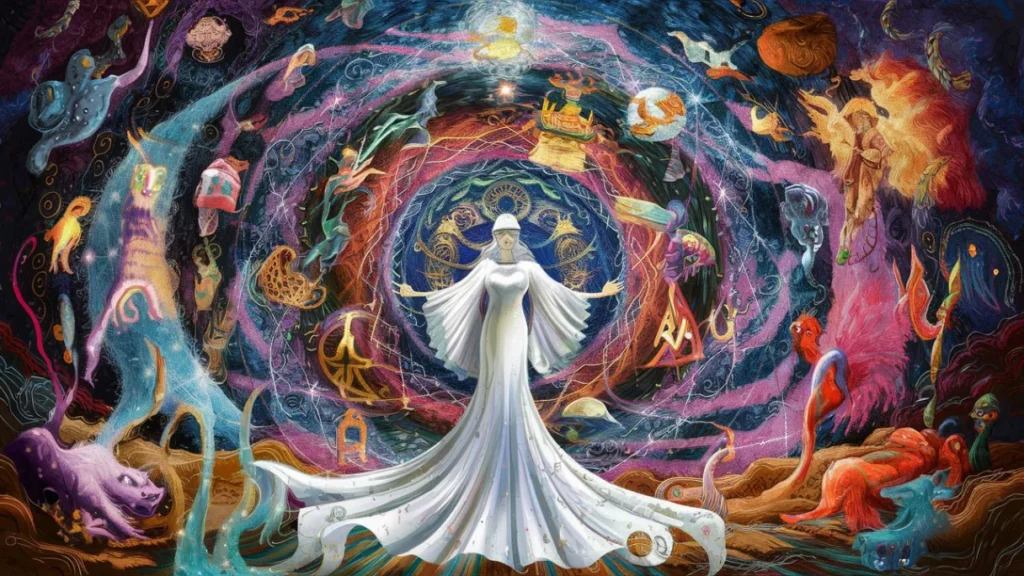Dreams and Spirituality: Exploring the Mystical Realm of the Subconscious

Dreams have long been a source of fascination for people across cultures and throughout history. Beyond the realm of mere entertainment or random neural firings, dreams hold a deeper spiritual significance that has been explored by mystics, philosophers, and psychologists alike. In this blog post, we’ll delve into the mystical realm of the subconscious and explore the connection between dreams and spirituality.
The Significance of Dreams in Spirituality

Dreams have been regarded as a bridge between the physical and spiritual worlds in many spiritual traditions. They are believed to be a means of communication with the divine, offering guidance, insight, and even prophecy. In ancient Egypt, dreams were considered messages from the gods, and dream interpreters held a high status in society. Similarly, indigenous cultures often view dreams as a way to connect with ancestors, spirit guides, and the natural world.
In Hinduism, dreams are seen as a state of consciousness where the soul detaches from the physical body and experiences different realms – https://hiddensignificance.com/. This concept is closely related to the idea of astral projection, where the soul is believed to travel to other planes of existence during sleep. Lucid dreaming, a state in which the dreamer becomes aware that they are dreaming and can control the dream’s content, is also associated with spiritual practices in various traditions.
Abrahamic religions, such as Judaism, Christianity, and Islam, have numerous accounts of prophetic dreams in their sacred texts. The Bible features several instances of God communicating with people through dreams, such as Jacob’s dream of the ladder to heaven or Joseph’s dreams foretelling his rise to power in Egypt. In Islam, the Prophet Muhammad’s revelation of the Quran is said to have begun with a dream in which the angel Gabriel appeared to him.
The Role of Dreams in Personal Spiritual Growth
Beyond their significance in religious and cultural traditions, dreams can also play a crucial role in personal spiritual growth. By paying attention to our dreams and exploring their symbolic content, we can gain valuable insights into our subconscious minds and the deeper aspects of our being.
Dreams often serve as a mirror, reflecting our fears, desires, and unresolved issues. By confronting and integrating these aspects of ourselves, we can achieve greater self-awareness and emotional healing. This process of inner work is a fundamental aspect of many spiritual paths, as it helps us to let go of limiting beliefs and patterns, allowing us to connect more fully with our authentic selves and the divine.
Moreover, dreams can provide guidance and direction on our spiritual journeys. They may offer answers to questions we’ve been grappling with, present us with challenges to overcome, or reveal new perspectives on our lives. By cultivating a relationship with our dreams and learning to interpret their symbolic language, we can tap into a rich source of wisdom and guidance.
Dreamwork Techniques for Spiritual Exploration

There are various techniques and practices that can help us to engage with our dreams more effectively and explore their spiritual dimensions. Some of these include:
- Dream journaling: Keeping a dream diary and recording our dreams upon waking can help us to remember them more clearly and track patterns or recurring symbols over time.
- Dream incubation: This practice involves setting an intention or asking a question before sleep, inviting our dreams to provide insight or guidance on a specific issue.
- Dream sharing: Discussing our dreams with trusted friends, family members, or a spiritual community can offer new perspectives and help us to identify blind spots in our own interpretations.
- Lucid dreaming: Cultivating the ability to become aware that we are dreaming while still in the dream state can allow us to explore the dream world more consciously and even engage in spiritual practices within the dream.
- Meditation and visualization: Incorporating dream imagery into our waking spiritual practices, such as meditation or visualization, can help to bridge the gap between the conscious and subconscious minds.
The Collective Unconscious and Archetypal Dreams
In addition to their personal significance, dreams may also tap into what psychologist Carl Jung called the collective unconscious – a shared repository of symbols, myths, and archetypes that transcend individual experience. Archetypal dreams, which feature universal symbols such as the wise old man, the great mother, or the hero’s journey, can provide insight into the broader human experience and our shared spiritual heritage.
By exploring these archetypal themes in our own dreams, we can connect more deeply with the collective wisdom of humanity and gain a greater understanding of our place in the larger web of life. This recognition of our interconnectedness is a key aspect of spiritual growth, as it helps us to move beyond a narrow sense of self and embrace a more expansive, compassionate perspective.
Dreamwork in Spiritual Traditions and Healing Practices
Dreamwork has been incorporated into various spiritual traditions and healing practices throughout history. In many indigenous cultures, shamans and healers use dream practices to diagnose illness, communicate with spirits, and facilitate healing. In the Tibetan Buddhist tradition, dream yoga is a spiritual discipline that involves cultivating awareness within the dream state to accelerate spiritual awakening.
In modern times, dreamwork has been integrated into various forms of psychotherapy and spiritual counseling, such as Jungian analysis, Gestalt therapy, and transpersonal psychology. These approaches recognize the value of working with dreams as a means of promoting emotional healing, self-discovery, and spiritual growth.
Conclusion
Dreams offer a fascinating window into the mystical realm of the subconscious, bridging the gap between the physical and spiritual worlds. By exploring the spiritual significance of our dreams, we can tap into a rich source of guidance, insight, and personal growth. Whether through engaging in dreamwork practices, studying the dreams of spiritual traditions, or simply paying attention to the symbolic content of our own dreams, the process of dream exploration can be a powerful tool for deepening our connection to ourselves, others, and the divine. So let us welcome the wisdom of our dreams and embrace the transformative power of the subconscious mind on our spiritual journeys.
















